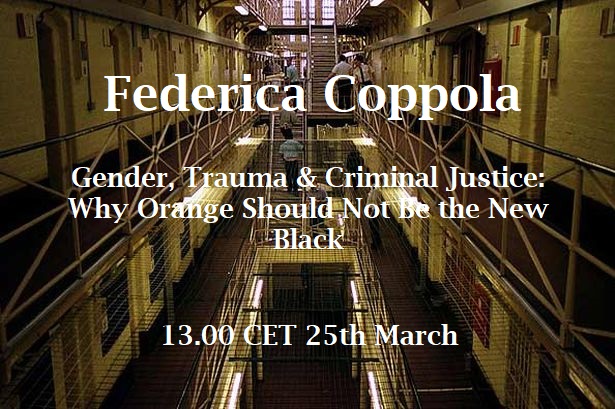Virtual lecture Friday March 25 13:00 CET

In this talk, Federica Coppola addresses the notorious relationship between trauma exposure and criminal justice involvement with a special focus on women. Studies indicate that women – especially those belonging to other minorities – are more likely than men to have experienced persistent trauma before coming into contact with the justice system. For women with histories of trauma, confining measures, such as prison, are apt to perpetuate further re-traumatization. Despite the pervasiveness of trauma among justice-affected women, criminal legal systems largely continue to disregard the impact of trauma on the mental well-being and social behavior of this population. This disregard has resulted in laws and policies that often ignore, or even amplify the adverse effects of trauma on justice-affected women. Drawing upon (neuro)scientific insights into trauma, healing, and behavior change, this talk explores normative and policy avenues for turning criminal justice into a better trauma-informed and trauma-responsive system, one that values gender-specific needs. Such avenues range from potential revisions to responsibility and sentencing criteria to a deeper exploration of the possibilities besides reliance on prisons such as collaborative education and restorative justice.
Federica Coppola is a Senior Researcher at the Department of Criminal Law at the Max Planck Institute for the Study of Crime, Security, and Law. She holds a JD from University of Bologna Law School (2010), an LL.M in Comparative, European and International Laws (2014) and a PhD in Law from the European University Institute (2017). From 2017 to 2020, she was awarded the Robert A. Burt Presidential Scholar in Society and Neuroscience Fellowship from the Center for Science and Society at Columbia University. In concomitance with this position, she was a lecturer in Criminal Law & Neuroscience at Columbia Law School and a postdoc in the Social Relations Lab & the Center for Justice at the Department of Psychology at Columbia University. As a Columbia University faculty, she was also involved in prison education programs in New York City.
Federica is an expert in criminal law theory, theory of punishment, neurolaw, criminal justice, restorative justice, incarceration and human/constitutional rights. Her scholarship has been published in law reviews, interdisciplinary journals and edited collections. She is the author of two monographs— The Emotional Brain and the Guilty Mind: Novel Paradigms of Culpability and Punishment (Hart Publishing, 2021); The Real Pain of Punishment: Eradicating Social Exclusion from Criminal Justice (Cambridge University Press, forthcoming)—and the editor of the collective volume Social Rehabilitation and Criminal Justice (Routledge, forthcoming).
Register here









